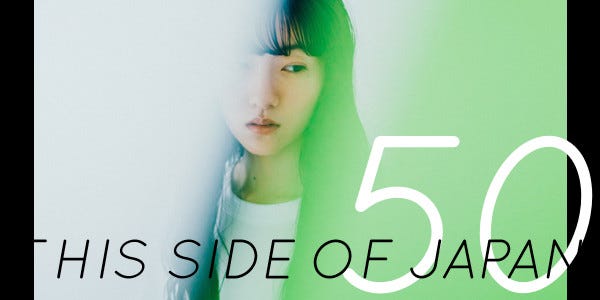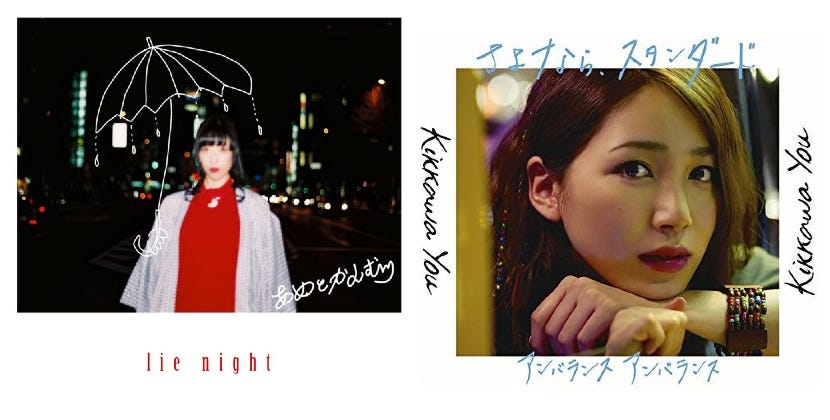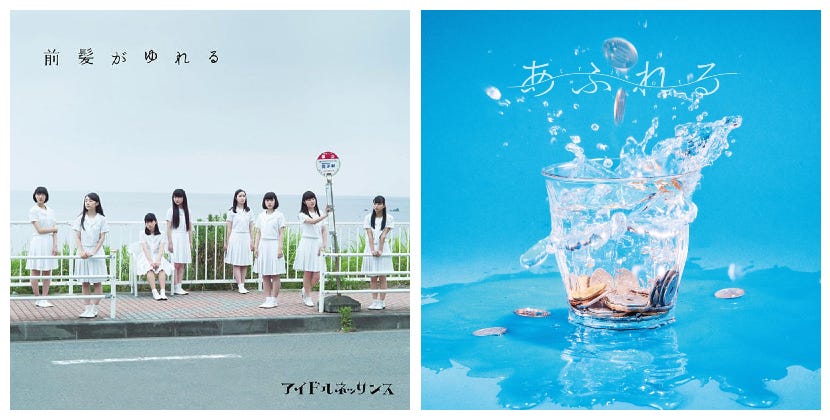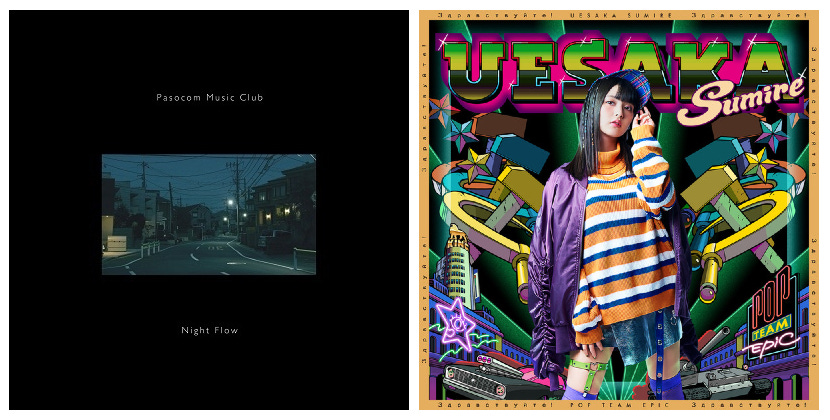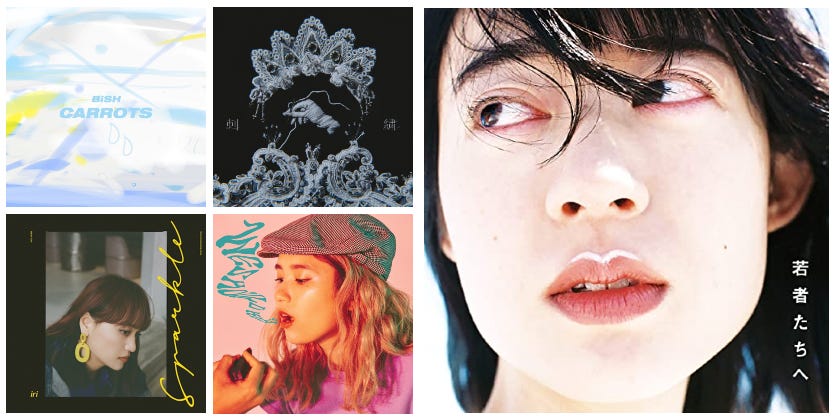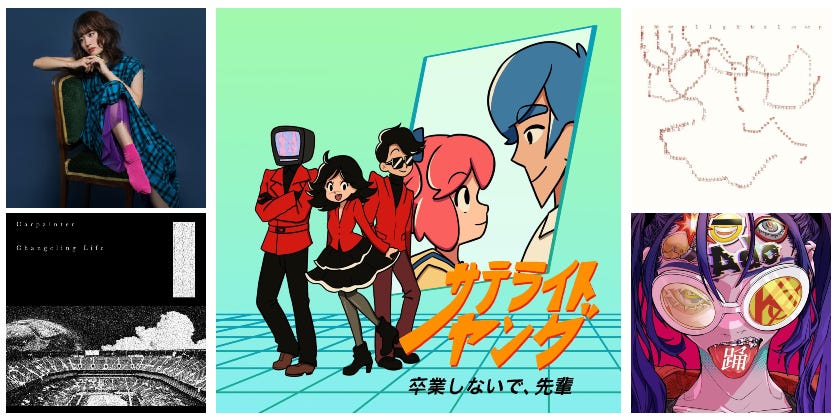Issue #50: This Side of Japan's 50 Favorite Songs of 2017-2021
Celebrating the newsletter's 50th issue with a list of my 50 favorite Japanese tracks from the last 5 years
Hi! Welcome to This Side of Japan, a newsletter on Japanese music, new and old. You can check out previous issues here.
This Side of Japan is now in its 50th issue! Whether you’ve been a follower since day one or subscribed to the newsletter from the previous issue, thank you so much for reading! It really doesn’t feel that long ago when I set up this Substack in persuasion by Tone Glow’s main editor Joshua Minsoo Kim. And along with hitting issue #50, this year also marks a couple of other personal milestones.
Ten years ago, I decided to write my thoughts out about Sleigh Bells’ then-new album, Reign of Terror, for a friend to read, and I found the process so fun that I kept doing it since on various personal blogs as well as web publications run by people I’m honored to call my friends. Five years ago, I started to dive deeper into Japanese music and began to write more about it, including an early Medium column titled, yes, This Side of Japan. The subject has been my main focus since, and it’s all I think about now that I have this Substack newsletter.
To celebrate This Side of Japan’s 50th issue as well as my time writing about music, I wanted to share my favorite Japanese songs since 2017, the year I really began to follow up with new Japanese music. These are all wholly personal choices, and they will inspire some personal entries from me. But hopefully this list can introduce you to some great music from the past five years.
Here is the Spotify playlist of this list, featuring what’s available on the platform. Here is a text list if you want just the song titles (plus links to the songs).
After this big celebration, I will be taking a month-long break from This Side of Japan to recharge going into the second half of the year. There will be no new issues of This Side of Japan during the month of May, but I will be sharing a Monthly Listening post for April and May. Idol Watch will still go live as regularly scheduled, the March/April issue slated to be out next Friday. You can also catch up with past issues in the mean time. See you in June!
1) “Narashite” by Haru Nemuri
First, it was the sound. And then came the lyrics. This explains the experience of just about every piece of new Japanese music I fell in love with in the past five years as you will see as you go further down this list, but it plays the most crucial when it comes to me discovering Haru Nemuri and her essential album, harutosyura. Her music felt so much of a product of the current times with her interpreting punk rock through a DAW, paying no mind to the rules of any strict schools of genre. And then came the lyrics: “‘I couldn’t jump into the Chu-oh-sen,’ you said without crying,” she sings a line inspired by a real text she got from a friend. She then quickly shifts gears, her voice turning more intense, more urgent.
Harutosyura came out not even a couple years since I began immersing myself in Japanese music, looking for any and all information about what’s new coming out from Japan. I was still awed by musicians expressing profound ideas, or really any sentiments found outside of daily conversation, in my first language. I had very little exposure to a sensitive topic like suicide ideation talked about in Japanese, but what shook me to the core from Haru Nemuri was her calls to, using her own words elsewhere in the album, make more noise of you to check you are indeed here, present and alive.
Haru Nemuri shouts so intently in “Narashite,” holding on so tightly to the second person, her words comes through as though it’s directly addressed to you, the listener. “Distortion, make noise of your life right now,” she calls out in the chorus, her intensity blurring into desperation especially following such a morbid lyric. The specific energy poured into the song frame the lyrics into something far more serious than a mere live-show command and more matters concerning life and death. But as white-knuckled as her music feels throughout harutosyura as well as her future works, it comes from a place of immense sincerity as she sounds genuinely invested in someone else’s livelihood. “I’m telling others to narashite! (make noise!), but really I think I’m telling myself more than anybody else,” Haru Nemuri told Natalie about “Narashite” in 2018. Her music, then, is the greatest act of self-care.
2) “Ikkyu-san” by Wednesday Campanella
Wednesday Campanella’s time as a mainstream concern came and went, but it’s hard to think of a more exciting period in J-pop during the last five years than when they would show up on various media outlets. The group appeared on TV as though they crash landed into the line-up of popular music shows, none of which really seemed to know how to handle them. Former member Kom_I followed her own rules whenever she performed the songs, often storming off stage, the poor cameraman having to chase her as she ran around in the studio. The show producers tried their best to showcase Wed Camp’s work for the viewer’s at home, but they seemed to not fully understand what made it so interesting. None of their lyrics make any sense, even to the authors themselves. But apparently, that’s the appeal?
Wednesday Campanella’s music isn’t completely incoherent to be clear. A single that’s one of the most known by the mainstream audience, “Ikkyu-san” is about, well, Ikkyu-san, the storied Buddhist monk, and its lyrics folds in references to episodes of his life famously chronicled like a generational fable: the song’s funk breakdown of a bridge flips the monk’s tiger hunt—torataiji—into an infectious hook. But like many other Wed Camp songs, “Ikkyu-san” lives and ends by the title. The group doesn’t at all aim to strike profundity through their source material. If anything, they often warp the source material into something unrecognizable with the lyrics either taking its details out of context or reducing it into mere syllables on a page.
For those who grew up on pop music with its lyrics treated as vehicles for narrative or meaning, Wednesday Campanella’s approach to lyrics can feel outrageous: it doesn’t seem to say particularly anything. But freed from their duty to let the song stand as a story or poetry, the group gets to focus more on the immediate and instinctive pleasures like rhyme and flow. Kom_I’s animated delivery pops out of the page. Even when she’s actually telling a story, her cadence ignores whether the details are being communicated clearly in favor of how the words themselves sound strung together. The very impenetrability becomes the point, if not the thrill behind the song, the unintelligible qualities forcing you to hear the words in other, intended ways. Wednesday Campenalla in “Ikkyu-san” tried to change how people heard pop songs, but they were maybe a bit too ahead of their time.
3) “Dogma Magma” by Seiko Oomori
I only heard Japanese being used in daily conversations with my parents until I started listening to Japanese music, where artists communicated far more complex ideas and emotions than what surfaces during the day-to-day. “Dogma Magma” felt revolutionary to my life in that regard with Seiko Oomori stuffing the lyric sheet with as much fuck-yous, both in Japanese and English, as the instrumentation in the baroque-rock production. The first blow to my conscience was “kekkon betsu ni shitakunaishi / mitasareterunoni shinpaishinaide (I don’t really care to get married / I’m satisfied so don’t worry about me),” an indifference which I also carry. And then there was the black humor based on the song’s base narrative of her as a god who had been turned into a Japanese woman: “When I woke up, I was Japanese / turned into a body that / had to put on make up / to go outside / even though I am a god.”
After I got deep into Oomori’s music, the lyrics that ended up resonating with me most in “Dogma Magma” were the ones in the chorus: “think and feel touch my yes / this life or that life / that’s not the only zero, anyone can be god.” Her best music shows understanding of a mind hitting rock bottom and having to lean on as a lifeline something like pop music that seems shallow on the surface. Her best records displays her awareness of how much power her music and words can hold especially for someone stuck in a darker place. And my favorite tracks by Oomori find her bravely taking responsibility of such a position and leading toward the light despite being against the odds. Internalizing all this in my first language for what felt like my first time, it was overwhelming but also the most rewarding.
4) “Eccentric” by Keyakizaka46
It saddens me whenever I think about Sakurazaka46 deciding to stay away from the Keyakizaka catalog for their live set lists after the name change. But maybe it’s for the better they put those songs to rest considering how tortured they sounded voicing words of deep self-loathing. “Eccentric” embodies this maudlin, teenage psyche, convinced the world is conspiring against them. “I don’t care to know what’s the truth / I’ll never be understood,” the idols trade paranoid lines like these between each other in quick succession, crowding the space as if to exaggerate how suffocated they are. The pianos dress the song to be more light to the touch than their later singles, but the ease in feel only lets the idols’ despondent vocals to lay more in contrast. Sapped of emotion other than anger and distrust, their cold voices give chills from how dead set they sound about their doomed fate.
I don’t blame anyone for thinking Keyakizaka46 took themselves too seriously with the idols so absorbed in their own darkness that they started to sound absurdly melodramatic. A part of the choreography of “Eccentric” infamously gestures to this self-seriousness: the group all take off their shoes and wave them around as they sing “I am eccentric, I’m fine with being the odd one,” expressing their sentiments almost too on-the-nose. But if the chosen gestures of Keyakizaka seem overwrought, it serves to illustrate a personality with rules so stubbornly self-defined. Their perspective frankly feels familiar for me in the way they seem so stuck in their own heads, they refuse to see the world from any other position. I was like them once, constantly at war with this inexplicable angst inside me. I understand if the idols want to close that chapter of their lives too.
5) “Mugen Mirai” by Perfume
Perfume’s music and their live performances have been lauded as forward-thinking, but I’ve also observed constant echoes of their past in their work. And their storied past informed Perfume’s creative endeavors in 2018 as much as the future. The same year that the three released their sixth album, Future Pop, saw them debut the Reframe concerts, which brought back old favorites and presented them in a new light. While the show did wonders to update and re-contextualize their catalog, it also reminded just how much history carries over to their present work.
Closing out the 2018 iteration of Reframe, “Mugen Mirai” contained the spirit of their best hits as much as it captured a fresh, new sound. The buzzing future-bass drop in the chorus stamps its time and place, but how the maximalist electronic sounds function as a metaphor to communicate this rush of inexplicable emotions didn’t feel so distant in approach from a song like “Polyrhythm.” “On and on, this polyrhythm / that scene from another time is coming back to me,” the three sang in 2008, presaging the feedback loop to be found all over their music. “Mugen Mirai” as a title—infinite futures—continues the theme: it peeks into a new, unforeseen vision that will settle eternally as a piece of their own history. The music might sound different, but the feeling remains the same as it did then.
6) “Labyrinth” by MONDO GROSSO ft. Hikari Mitsushima
Hikari Mitsushima in “Labyrinth” is so enveloped in the bliss of the present moment, so occupied by the sight in front of her, and she couldn’t have made the here-and-now sound sweeter: “we can’t go back after a kiss, a dance for only the two of us,” the actress sighs as she gets lost deeper and deeper into the pull of the music. But from the languid deep house beat to Mitsushima’s insistence to not look toward the gloom, everyone involved try their best to distract themselves from the fleeting nature of time. All that said, it’s when she gives into the inescapable truth that leads into the song’s finest moment: “don’t stop, I want to keep rocking / don’t say a thing, kiss me and help me forget,” she sings in the bittersweet bridge, ready to let go and come to terms with whatever happens next. For all the magic it provides to allow you to savor every lasting second, “Labyrinth” reminds moments become precious only because everything must eventually come to an end.
7) “FUSHIGI” by Gen Hoshino
“How relieving it would be if we could turn the days we felt love into words”: For a while, Gen Hoshino’s lyrics here for me seemed to sing about coming up short with the most fit words to articulate this indescribable thing he shared between him and a significant other. Nothing of the song from the warm, low-key R&B to Hoshino’s own delivery however suggests this situation of this perfect word being at the tip of his tongue to be some sort of personal frustration. He constantly questions what it exactly is that he has, not neatly synonymous with other things he knows. But now I don’t think he exactly wants to put a label on it. He wants to revel in this pure feeling at its undefined state as long as possible as though naming it would take away from its magic. It would be a relief but at what cost?
8) “Presence (Remix)” by STUTS & Takako Matsu with 3exes ft. T-Pablow, Daichi Yamamoto, NENE, BIM, KID FRESINO
I recently met up with the few friends I made at the temp job I had last year for what could be the last time. Reminiscing and laughing with them about the bullshit at the job is the one thing can help me feel like I experienced any of it all. And now that one of them was moving away soon, I don’t know if the band will ever get back together again. It’s this sweet, peculiar kind of relationship that I think of when Takako Matsu sings the bridge in “Presence”: “You meet someone / You break up with someone / And you keep on walking again.” She summed up her feelings on a more romantic than platonic relationship with those plainspoken lyrics while the guest rappers worked out their own life situations post-breakup. But since that temp job folded and the people I saw there became more of a distant memory, I’ve kept close Matsu’s comes-and-goes perspective. There will be more of these, she seemed to remind.
9) “BREAKING THE ROAD” by GANG PARADE
Devoted fans of GANG PARADE who had been following the idol group in 2017 can share to you the whole lore: the addition of S.I.S., the rental trade swapping Kamiya Saki for Aya Eight Prince, the creation of the group’s catchphrase and motto, “enjoy play, everybody’s playground!” Even for the uninitiated, the exuberant pop-punk embodies some of the excitement of them heading towards a new chapter but its fleeting speed also alludes to the feeling of a last hurrah surrounding the group at this moment in time: this was the last single with this exact seven-member line-up responsible for establishing the group’s foundational camaraderie-driven culture. The song’s message encompasses a universal sentiment of moving forward despite the fear of the unknown, but its power doesn’t feel completely genuine without this line-up bringing in this specific dynamic—you just kind of had to be there to feel the full impact.
10) “I LOVE ME” by 4s4ki ft. Masayoshi Iimori
4s4ki continues to reside as the nucleus of a internet-bred strain of underground J-pop with her connected to a constellation of producers ready to help give life to the music in her head. It’s only been two years with two different new projects since, but her collaboration with Trekkie Trax head Masayoshi Iimori remains the definitive sound of 4s4ki for me so far. His explosive EDM makes no room for subtlety, deep-frying his collaborator’s vocals and lyrics, and inspires 4s4ki to reach for the most visceral, straightforward thoughts to get at the depressive theme central to her work: “I don’t care anymore / want to sacrifice everything,” she cries out as she tries to convince herself to see another way screaming the titular lyric. It’s an absolute mess but only because it’s trying to reflect how she feels in the inside.
11) “WOMAN WOMAN” by DADARAY
The woman played by DADARAY’s Reis in “WOMAN WOMAN” exhibits some of the most vain behaviors to be found in Enon Kawatani’s various jazz-rock projects. “Got a scoop of a total stranger / let’s spill it all to that guy I like,” she schemes at one point to make her life feel a bit spicier. But as much as she appears foolish indulging in her narcissistic tendencies, she’s ultimately self-aware of becoming the victim of her own doing. As she sighs about her boring, unrealized life, there’s only one person she can blame for it to turn out this way.
12) “P.S.R.I.P.” by BILLIE IDLE
BILLIE IDLE operated in the idol scene as though their time would be up at any given moment, so they knew how to exactly go about it when they actually faced their last days together. The group in “P.S.R.I.P.” doesn’t get so sentimental about what they’d soon lose than the moments they’re building with each other right then and there, and the pop punk music, too, sounds too enthralled to care about anything else other than the present.
13) “lie night” by Ame To Kanmuri
It felt torturous for me at a certain age to be stuck at home while yearning to go out in order to mend a creeping loneliness. But what “lie night” taught me then is that throwing yourself into the night aimlessly just to be out can be exhausting in its own right. As if the hip-house beat didn’t already sound intoxicating, Ame To Kanmuri’s molm’o’mol adds a self-destructive edge to the cycle with mentions of alcohol being endlessly downed. Whether she remains idle or offers herself with reckless abandon, she ultimately ends up in the same place: in her bed, alone.
14) “Sayonara Standard” by You Kikkawa
I don’t understand the expression “I wish I was you.” Being me does not come with a reward worth the price of fighting deep insecurities. But I know I’ve wished to be someone else who I’ve perceived to be content living a simpler life, just following its currents and not asking for much—the very people who see something in me that they want for their own self. “You just don’t know the taste of it,” concludes Yuu Kikkawa in “Sayonara Standard.” I wished to tell those words to them back then about the kind of person they saw in me, but now I know those could be the very lyrics they’d sing back to me.
15) “HOT UP!!!” by Shiritsu Ebisu Chugaku
Ebi Chu had a lot going against them during the initial release of “HOT UP!!!” and the group frankly has yet to catch a break since with their line-up in constant flux. The obstacles, though, only fuel the song with increasingly more power whenever the idols perform the killer rock anthem, especially when it comes to the bridge. “Back then, we lost sight of what was important, didn’t we,” inquires Ayaka Yasumoto not before Hinata Kashiwagi hit back, “from now on, we won’t lose to anyone.” Whatever they got going on in their current lives, “HOT UP!!” allows them to exhume the ghosts that’s been haunting them.
16) “Harunohi” by Aimyon
The domestic bliss imagined in “Harunohi” sounds more distant of a dream than it did then as J-pop grows more pessimistic about the future. The song’s pure sincerity feels rare even relative to Aimyon’s subsequent works. The changed times and shifted attitudes, however, don’t make the romance behind “Harunohi” feel any less precious. The song may be literally inspired by fiction—it serves as the theme song to, out of all franchises, a Crayon Shinchan film—but I still wish for it to be a reality I can one day live to experience.
17) “Koukan Note” by Idolrenaissance
“Koukan Note” lets you see through the naive eyes of Idolrenaissance as the spring breeze of a song sequesters the idols and their longtime crush in their own world. The latter, of course, doesn’t suspect a thing: “I want to tell you / that I’m standing right here,” the idols sigh to themselves in this tender anthem based on a precious, teenage innocence. Idolrenaissance go with the most mundane icebreaker—”good morning!”—when they finally speak up, but that pressure from an all-consuming feeling to turn thoughts into action is all too familiar.
18) “Afureru” by tricot
While tricot have let their fierce, athletic math rock express a variety of hard-to-parse emotions like exhaustion, excitement or anything in between, I’m most fond of what the band articulated through their wired music in “Afureru”: “You’re not shaking right now because you’re weak / it’s because something is burning inside you.” They don’t ignore the insecurities that threatens to paint the trembling as a product of fear, but how frontwoman Ikkyu Nakajima rises above despite the odds elevates the song into a kind of theme music.
19) “reiji no machi” by Pasocom Music Club
While the propulsive electronic music of Pasocom Music Club wonderfully recreates the hustle and bustle of the modern city, “reiji no machi” is dedicated not so much of an actual existing place than the locale as it lives in memory. “The city grows distant, the sadness of time passing by / We’ll perhaps remember / the moving shadows and the touching air,” guest vocalist Warabi Inoue sings in the chorus, coloring in the emotions behind the metropolitan scenery conjured by the duo’s beats. The synth-pop awakens such awesome yet poignant details so deeply etched into the senses.
20) “POP TEAM EPIC” by Sumire Uesaka
This wild electro-pop sounds like some serious tech malfunction put to music with its feverishly computing 8-bit synths and that gnarly grind of a bass line. Perhaps it’s a feel expected for a tie-up to a manga-turned-anime franchise as chaotic as Pop Team Epic, with Sumire Uesaka also channeling its destroy-and-rebuild attitude via lyrics: “Remake the world!” goes a central hook while the song eagerly dreams of erasing everything in sight to start over from a clean slate. If the over-stimulation of “POP TEAM EPIC” wiped out much of what’s on your mind, then it succeeded on what it sets out to do.
21) “Sixteen Year Old” by Maison book girl
Out of the constant flashes of sensory details, vivid and tactile as the group’s signature ASMR-like beats, emerges a disarmingly sincere line that catches me off guard every time: “It’s fine to think that you want to be loved.”
22) “Cakes” by Homecomings
Through their warm, homely indie-rock, Homecomings sing of the intimacy, and a surprising sense of security, to be found in staying hush about labels in a relationship.
23) “LAST DANCE” by lyrical school
Lyrical school cherish what the sweet present moment over a sentimental loop as the end to their precious night fast approaches.
24) “One Last Kiss” by Hikaru Utada
Hikaru Utada preemptively eulogizes a beautiful relationship at the brink of collapse while the ghastly synth-pop carries the elegiac mood.
25) “Megane No Otokonoko” by BEYOOOOONDS
Has there been a more audacious debut (!) idol single in the past five years than “Megane No Otokonoko”? The Hello! Project group announce their arrival with an extensive intro—nearly one-third of the synth-pop track’s run time—that doubles as an prologue to the main feature of a love story of a girl. The record as audio frankly feels secondary in experience considering the superior music-video accompaniment that fully fleshes out the star characters and their relationships. BEYOOOOONDS’s abandon of traditional pop structure and form continues to be the most exciting, defining thing about them as they consistently add layers to their work, elevating it as, well, beyond a musical record.
26) “Good Morning” by chelmico
Witnessing the exponential growth of chelmico as artists since the duo’s self-titled debut has been one of the most rewarding experiences following J-pop during the past five years. Rachel and Mamiko have become some of the best rappers in the scene with both constantly experimenting with meter and cadence as they weave intricate rhymes. But the two have also sharpened their skill as songwriters, turning in such nuanced love songs filled with brilliant hooks. “Good Morning” is one of the many great explorations of a relationship in the grey zone between the casual and serious, the duo in constant frustration of how much their love thing occupies their mind even when they’re not around.
27) “JOKER” by Sayaka Yamamoto
The string-laced power pop tugs at the heartstrings but also Sayaka Yamamoto realizing the surprising amount of influence her significant other has on her.
28) “GOKU VIBES” by DJ CHARI & DJ TATSUKI ft. Tohji, Elle Teresa, UNEDUCATED KID & Futuristic Swaver
Tohji’s mania, Elle Teresa’s raunchiness, UNEDUCATED KID and Futuristic Swaver’s neo-swag rap flexes, all aboard ZOT ON THE WAVE’s neon trap beat—only few other posse cuts come close to this rap anthem.
29) “Influencer” by Nogizaka46
Nogizaka are pulled by a force bigger than them by the center of their world, turning attraction into a double entendre.
30) “Tanoshii Kenobi” by Chara & YUKI
Two eternal J-pop icons reunite to just hang out, but that loose attitude to it all is what precisely leads to the sweetest R&B track.
31) “I am me.” by BiSH
After years spent wallowing in self-loathing, the punk idols sound resolute, ready to face another day in stride.
32) “Shishu” by Kayoko Yoshizawa
Kayoko Yoshizawa’s storybook pop matures into an elegant form, its tender sound also capable of delivering more shattering heartbreak in this call-out to a long distant former lover.
33) “Drama” by Hitsujibungaku
The bleak outlook on life in “Drama” initially defined the voice and personality of Hitsujibungaku. Attached to an album aptly titled Wakamonotachi-e, the song and its malaise of youth made the indie-rock trio somewhat emblematic of the forthcoming generation. “Our times of youth is about to be over / There’s no meaning in us being alive,” frontwoman Moeka Shiozuka bluntly sings over an equally bruised guitar riff, and she casually sings hopelessness as if we knew of this already. The band has grown wiser, more considered and at peace with their inner angst now, though this candid embrace of fatalism is what still attracts this band to many indie-rock fans today.
34) “Sparkle” by iri
Iri offers her shoulder for you to lean on as well as this stylish R&B track in hopes for it to be the music you put on to forget about the horrible moments of yesterday.
35) “WE SHOULD KISS” by ZOMBIE-CHANG
A sloppy, delirious acid-house bass line provides the perfect soundtrack to Yung Meirin’s reckless late-night adventures.
36) “Heuristic City” by Philosophy No Dance
The reluctance of Philosophy No Dance to break away from a relationship of the past becomes so intertwined with their connection shared with their own music as they lean on sounds so steeped in nostalgia.
37) “Spider Line” by MIGMA SHELTER
A relentless, ambitious single that lives up to MIGMA SHELTER’s self-proclaimed title as the psych-trance idol group.
38) “Lightpool” by sora tob sakana
Sora tob sakana is captivated by the scene unfolding in front of them: a busy metropolis moving like a mean machine but also the starry math-rock music with its own fascinating bells and whistles.
39) “Kenzen No Asa” by yonige
Lively power-pop riffs once offset Arisa Ushimaru’s stern writing on the malaise of youth, but it settles into a weathered, melancholy sigh reflective of the lyrics with scenes of the painfully mundane creeping back in.
40) “Higher” by Mall Boyz
“I’m going to live in the sky high up in the clouds / do it all and then die”: it’s quite the mission statement from Tohji not just because he flexes, “since I was a kid, I’ve always been a genius,” just in the previous bar. You can chalk up his gassed-up mentality in “Higher” as simply the default state of a young mind, a snot-nosed vibe best captured by the glorious swag-rap beat that gleams with arrogance in material or personality. But three years since the Mall Tape with fellow partner-in-crime gummyboy, Tohji has not been wrong about the exact elevation in which he now resides in the scene. He willed it all into existence—or did he already see it coming?
41) “Zoom” by valknee, Haruko Tajima, Namichie, ASOBOiSM, Marukido, AKKOGORILLA
One thing we can thank the quarantine: an incredible pass-the-mic posse cut by some of the best rappers of the scene.
42) “FOR EXAMPLE ??” by EMPiRE
While the group has settled into their own as a solid pop unit, their work from when they were yet an unproven new generation of WACK echoes the most sentimental.
43) “Regret” by Shinichi Atobe
Out of all of the strangely titled loops he has put out since his return, this hypnotic, intimately warm cut is the one I keep returning to.
44) “Ningen” by Carry Loose
These idols of WACK were led a rather cruel fate, but their faith in the good of people in one of their last songs remains poignant.
45) “Harukaze” by Leo Ieiri
During a flight to Japan in 2018, I couldn’t help but feel a kind of satisfaction after recognizing most of the songs and artists featured on an in-plane radio station named something like Today’s J-pop. Arashi was in there as well as E-girls, Daichi Miura and Leo Ieiri’s “Harukaze.” This was maybe a year and a half into me getting serious following new Japanese music. Looking back now, I knew only so little then—perhaps a blessing in disguise considering how much worse my purchasing habits would be if I traveled to Japan now. The earnest, if not sappy pop of “Harukaze” not only reminds me of Japan as it feels distinctly J-pop, it also stands as a sort of souvenir reminding me of how I felt then during my trip back to Japan and how much more I would come to appreciate.
46) “Bloom in the City” by SHE IS SUMMER
MICO looks to the bright side of a just-dissolved relationship to the tune of equally cheery funk-pop.
47) “Don’t Graduate, Senpai!” by Satellite Young
Satellite Young’s Bubble-era pastiche in “Don’t Graduate, Senpai” seemed novel during the time of the song’s release, if you can believe it. The trio nails just about every tic and trend of the borrowed era from the blindingly shiny synth kit, the classic school-ground narrative to the sugar-sweet, Japanese-English-blending hooks. While the song dates itself by design, Satellite Young signaled a new wave of J-pop romanticizing a not-so-distant part of its own past.
48) “CQ Tokyo” by Phew
The bruised synths help shut out every other noise and immerse you into the haunted sonic world of Phew.
49) “Changeling Life” by Carpainter
One of the many exemplary, rave-nostalgic hits from the Trekkie Trax crew.
50) “Odo” by Ado
Ado’s delirious command to get bodies moving, and the explosive amount of sounds supplied in support of it, still thrills while slowly influencing future pop to come.
This Side of Japan has a Ko-Fi as a tip jar if you want to show appreciation. A subscription to This Side of Japan is free, and you don’t have to pay money to access any published content. I appreciate any form of support, but if you want to, you can buy a Coffee to show thanks.
Next issue of This Side of Japan is out in June. You can check out previous issues of the newsletter here.
Need to contact? You can find me on Twitter or reach me at thissideofjapan@gmail.com



